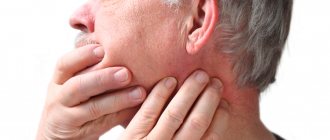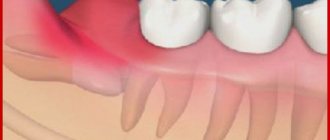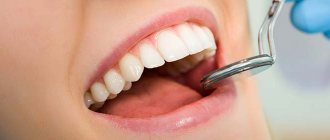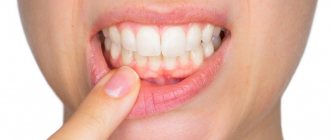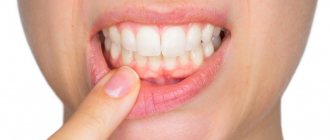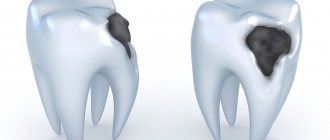Aching teeth: causes of pathology
When a patient comes to see a dentist and asks why his teeth are hurting for no reason, every good doctor will answer that this does not happen. There are always reasons. Any dental problem has its roots, and aching pain in the teeth is no exception. Another point is that the causes of this symptom are quite extensive and can be associated with a number of characteristics of the body and disturbances in the functioning of its systems. Experts identify more than a dozen factors that can cause aching pain in the teeth.
- Congenital hyperesthesia.
Increased sensitivity of enamel can be inherited, which is why a person may experience discomfort when exposed to temperature and chemicals. - Chips, cracks and other damage to the enamel.
Tooth injuries lead to dentin exposure and also facilitate the penetration of pathogenic microorganisms. - Thinning and weakening of enamel.
This can happen for several reasons. First of all, due to a lack of vitamins and minerals. The second common reason is weakening of the enamel as a result of frequent whitening procedures. - Caries and its complications.
Typically, aching pain in the teeth occurs in the middle stages of the disease. - Periodontal diseases in the active stage.
With periodontitis and periodontal disease, the necks of the teeth are exposed, which makes them (and surrounding tissues) very sensitive to irritants. The same applies to the wedge-shaped defect. - Infectious diseases,
especially chronic ones. Influenza, sinusitis, sinusitis - these diseases can sometimes provoke aching pain in the teeth and jaw. - Problems with the gastrointestinal tract.
- Stress, fatigue, lack of sleep.
- Hormonal disbalance.
Often, aching pain in the teeth occurs during pregnancy. - Inflammation of the trigeminal nerve,
when the pain “radiates” to the teeth. - Allergic reaction
to medications.
Physiological processes
The most common factors that cause pain at night are physiological. Most often, this phenomenon is caused by a horizontal position taken during rest. In this position, blood flows intensely to the head, brain and jaws, which increases pressure on the inflamed tissues and nerve endings of the teeth. It should be noted that this process is not typical for all dental diseases. The most common cause of acute and severe toothache at night is pulpitis. At this time of day, excessive pressure forms in the inflamed pulp due to increased blood flow, and bundles of nerve fibers begin to send active signals to the central nervous system. Excruciating pain, mainly at night, can also occur with periodontitis and periodontitis.
Diagnosis of pathology
For any manifestations of pain and discomfort, you should contact a specialist as soon as possible. Only a qualified doctor can correctly diagnose and identify the exact cause of the problem. If a patient comes with a complaint of aching pain in the teeth, a number of standard diagnostic procedures are first performed:
- visual examination of the oral cavity using a probe;
- tracking reactions to temperature stimuli;
- X-ray examination, which can reveal the presence of hidden problems and complications (granulomas, cysts, etc.).
If the pain and aches in the teeth are not directly related to dentistry, the attending physician refers the patient to other specialists. Most often this is a neurologist and maxillofacial surgeon. The localization of pain also helps to determine the root cause.
- Local.
Aching pain covers one or more teeth. This is usually associated with injuries and dental diseases. In some cases, this is a consequence of infectious diseases. - Generalized.
The entire dentition “aches.” The reasons why all teeth ache are usually associated with pathologies and diseases of the enamel.
The teeth of the lower jaw often ache more (especially the front incisors). In many people, they react more strongly to temperature changes, chemical irritants and inflammation of the trigeminal nerve, when pain responds in the anterior part of the lower jaw. On the other hand, the answer to the question why the lower teeth ache is exactly the same as in the case of the upper teeth: there are no separate reasons.
Why do my jaws and all my teeth hurt?
In addition to caries, there are a number of purely dental causes.
- When teeth with sensitive enamel are exposed to hot and cold, spicy and sour, discomfort may appear in the entire jaw.
- It is often difficult to identify the source of pain in pulpitis (inflammation of the neurovascular bundle) or periodontitis (a complication of pulpitis).
- Treatment of dental cysts also provides relief from pain in the entire dentition. With purulent inflammation of a long-formed cyst, pain without clear localization may occur.
- An erupting wisdom tooth, especially one that is incorrectly located in the jaw, also brings significant discomfort. When the eighth molar touches the nerve endings of neighboring teeth, the pain along the chain not only spreads throughout the jaw, but also radiates to the ears and temples.
- When your jaw hurts after tooth extraction, you need to urgently consult a dentist. Such pain usually indicates the development of a complication.
An orthodontic patient who had braces installed a few hours ago also experiences general discomfort. But he must be warned in advance about the appearance of unpleasant sensations.
How to treat aching pain in teeth?
A treatment plan is drawn up after the diagnostic results, when the cause of the pathology is identified and pain is localized. Conventionally, several techniques can be distinguished that are used depending on the factors contributing to the occurrence of pain.
- Therapeutic treatment. It is prescribed when the main cause of aching pain is caries or periodontal disease. In case of caries, filling or endodontic treatment is carried out (if bacteria have penetrated the pulp). In case of periodontal inflammation, special ointments and antiseptics are prescribed, curettage is performed, and in severe cases, teeth are splinted.
- Prosthetics. In the presence of a wedge-shaped defect and serious damage, dental prosthetics are performed with single crowns or bridges. In case of enamel pathologies, the doctor may recommend veneers, which are installed to achieve a certain aesthetics.
- Restoration and strengthening of enamel. What to do if all your teeth ache? If the patient has weakened and thinned enamel, it is necessary to strengthen it. First of all, the doctor treats the enamel surface with special compounds based on calcium and phosphorus, and also prescribes a special diet and means that strengthen the immune system and the health of the body.
To eliminate pain, painkillers (Nurofen, Nimesil and others) can be prescribed. If the aching pain is not associated with dental problems, treatment is carried out by doctors of relevant specializations.
Ways to eliminate pain
You need to visit a dentist as soon as possible to identify the specific cause of the discomfort. Self-medication will not be successful; such actions can only lead to the development of complications. At home, you can only reduce pain for a short time in order to wait for a trip to a specialist:
- Painkillers. They will help reduce the manifestation of pain, regardless of what caused the symptom. You can take Nise or Ketarol according to the instructions. If there is nothing suitable, a Paracetamol tablet will do.
- Infusion of chamomile. Pour boiling water over a tablespoon of dry raw materials. When the liquid has cooled, rinse your mouth.
- Soda + salt. Dissolve a teaspoon of salt + baking soda in a glass of warm water. You need to rinse your teeth every two hours.
Prevention of aching teeth
The best way to prevent an unpleasant symptom is to follow preventive measures. Despite the fact that the enamel itself is very strong, improper lifestyle and exposure to the external environment gradually weaken and destroy it. If you have sensitive enamel, you need to carefully choose hygiene products. In particular, it is recommended to avoid hard toothbrushes and use toothpastes with calcium and fluoride. An equally important point is the right diet. It is necessary to reduce the consumption of spicy, sour and sweet foods to a minimum, and give preference to fermented milk products and foods high in vitamins A and B. Temperature changes are a big stress for sensitive enamel, so the best solution is to drink drinks at room temperature.
Publisher: Expert magazine about dentistry Startsmile.ru
Author of the material: Yaroslav Ikonnikov
What to do if your lower front tooth hurts
If your teeth hurt often and quite severely, first of all you need to make an appointment with a doctor. The tips below will help relieve pain while you wait to see the dentist.
- Cold compresses. Apply a cloth dampened with cold water to the painful area. This will help with mild pain. Periodically, the compress needs to be re-wetted.
- A solution with soda will help reduce pain. Rinse your mouth with it as often as possible.
- Clove oil can also be used in the fight against illness. Place a drop of the product directly on the tooth.
- You can also apply a clove of garlic, cut in half, to the affected area.
- A compress of calendula and valerian tincture, taken in equal proportions, will help. Soak a cotton pad in the solution and apply to the tooth
- You can put a little ground black pepper and salt in cheesecloth. The resulting compress should be placed on the sore spot.
- You can rinse your mouth not only with soda, but also with a decoction of sage and chamomile.
- Peel the beets and grate them on a fine grater. The resulting mass can be applied to the teeth.
- Medications. It is recommended to take the following drugs for acute toothache: Analgin, Ketanov, Nise, Nimesil, Diclofenac, Bral, Ketonal, etc.
The lower front teeth are more fragile than the chewing teeth, so they require special care and careful treatment. If teeth require aesthetic restoration, the doctor must carefully select the desired color of the filling so that it does not stand out and is as natural a color as possible.
When should you see a doctor immediately?
When toothache occurs at night, most people try to postpone a visit to the doctor at least until the morning, but they often forget about the problem, especially if the discomfort subsides. This approach can lead to serious complications, including sepsis and other serious diseases; Moreover, there are a number of cases when a person needs medical care immediately.
At the dentist's office
It is necessary to call an ambulance or go to a 24-hour dental clinic in cases where toothache is accompanied by the following symptoms:
- severe swelling that spreads to one part of the face;
- temperature increase;
- difficulty swallowing or breathing;
- numbness or loss of sensation in the affected part of the face;
- severe headache, dizziness, rapid heartbeat.
Cheek swelling
In addition, it is necessary to immediately consult a doctor in cases where nighttime toothache constantly intensifies and is not relieved by painkillers.
Summary of GCD on valeology in the middle group “Why do my teeth hurt?”
Elena Farenik
Summary of GCD on valeology in the middle group “Why do my teeth hurt?”
Description of the material: I bring to your attention a summary of GCD on valeology in the middle group (4-5 years old)
on the topic
“
Why do my teeth hurt ?” Goal: to help expand knowledge about teeth and their functions; instill hygiene skills: rinse your mouth after eating, brush your teeth , activate children’s vocabulary with the words: dentist, dentist. To cultivate elementary valeological ideas and the desire to take care of your teeth.
Tasks:
Educational:
• teach the basics of personal hygiene;
• expand children's horizons about personal hygiene items;
• consolidate children's knowledge about foods that are beneficial and harmful to healthy teeth.
Educational:
• instill healthy lifestyle skills, develop hygiene skills: rinsing the mouth, brushing teeth;
• develop creative imagination.
Educational:
• cultivate a positive attitude towards hygiene rules in children;
• cultivate responsiveness and kindness;
• create a positive emotional mood.
Equipment and materials: a bear with a bandaged cheek, presentation, toothbrushes with pieces of cotton wool, video of how Pingi and Kroki brush their teeth
Content.
There's a knock on the door. A bear comes to the children.
Game surprise moment.
- Hello, Mishenka, what happened to you, why are you so sad and your cheek is bandaged?
-Hello guys. A big misfortune happened to me. You know that I love sweets, and it so happened that I ate a whole barrel of honey. And my tooth immediately started to hurt.
-Well, how can you do that? Is it really possible to eat so much honey? Have you even brushed your teeth?
-No, why? -Then come to our lesson and listen carefully.
Guys, I’ll tell you a riddle now, and you try to guess
The squirrel gnaws the kernels,
shells are falling,
and for this we need
our squirrel. (teeth)
.
That's right, teeth . Today we will talk about teeth and how to properly care for them.
-Tell me where the teeth ? (In the mouth)
.
-Why do we need them?
(To eat, chew food, speak clearly, smile beautifully).
That's right, children, if a person does not have teeth, then he will not be able to eat, but will simply choke on unchewed food. The stomach will not be able to cope with large pieces, and the stomach will hurt. And if a person cannot eat well, then he begins to get sick. teeth do . They help our body gain strength.
Educator: That's right. Teeth are a living organ . The teeth are covered with enamel , which protects them from damage. Look at the picture. Here is a picture of a tooth. What does he look like? slide 1
Children: For a heart, for a lock.
Educator: What color are healthy teeth ?
Children: White.
Educator: What do you think, is this a healthy or diseased tooth? Slide 2
Children: Sick.
Educator: How did you guess?
Children: It's dark and there's a hole in it.
Educator: Well done. A hole in a tooth is caries. My teeth hurt a lot , but...
-Tell me, who can help us if our teeth still hurt? Of course the doctor. A dentist is another name for a dentist. Slide 3
-And how should you behave in the dentist’s office? First of all, don’t be afraid. Because the dentist is our friend, not our enemy, and will not do anything bad.
-You need to brush your teeth every morning and evening and then they will be strong and healthy.
guys, tell me why my teeth hurt ?
Right. Because of harmful products.
Let's play the game "Harmful - Beneficial"
, in which we will remember what you need to eat to
your teeth healthy.
Slide 4 Educator: Well done! I heard Mishka, now you will eat only healthy foods and you guys eat only healthy foods.
Educator: You must not only eat right, but also take proper care of your teeth.
Children: This is a toothbrush. Slide 5
: And what is it for?
Children: To brush your teeth , take care of them.
Well done. You know everything. How many times should you brush your teeth ?
Children: Two.
Right. Morning and evening before bed, and you should also rinse your mouth after every meal. Each person should have their own toothbrush. What's that in the picture?
Children: Toothpaste. Slide 6
Right. First, you need to wet the brush, squeeze toothpaste onto it and thoroughly brush your teeth from top to bottom , and the inside of your front teeth in a circular motion.
Now we will play the game “Brush your teeth”
.
We prepared the finger and repeated the movements after me, without touching the teeth, as if the finger were a toothbrush.
Show your teeth. Oh, how white and clean they are.
- Guys. Raise your hands, those who brush their teeth . Do you have a toothbrush? Where is it stored? (presentation slide No. 7)
.
- Mishutka, don’t you know how to brush your teeth ? The guys and I will teach you.
First, let's conduct an experiment.
Experience.
Children take combs with cotton between the teeth and toothbrushes. Let the comb be a row of teeth, and the pieces of cotton wool between the teeth are “pieces of food”
, stuck in teeth.
Try brushing these “
teeth ” from right to left.
What happened? (The cotton wool is not removed)
.
Now move the brush up and down. What happened? (the cotton wool was removed, but not all)
.
Now repeat the up-and-down movement on one side and the other of the comb. What happened? All the “pieces of food”
jumped out.
So, how to brush your teeth ?
The guys draw their own conclusions. In parting, Mishka thanks the children and promises not to eat too many sweets anymore and to take care of his teeth, as the children taught him.
Now let's watch a video of how Pingi and Kroki brush their teeth
